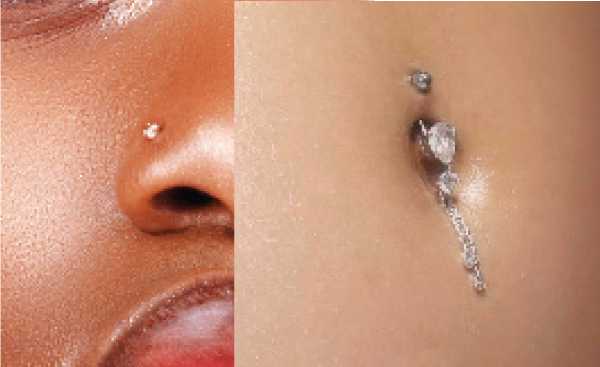Avoid body piercing INFECTIONS

Body piercing seems to be the in thing especially among young people. While it is seen as stylish and beauty enhancing, body piercing can be dangerous as you risk infection and other complications. This article offers you some useful advice on the management of body piercings.
Body piercings are today more common than ever – from belly to ears, lips to nose, it seems like you can now get away with a piercing in any part of your body. Whether it’s your first or tenth piercing, remember that body piercing also carries risks and can cause complications.
Where you get your piercing from and how it is done is important: don’t attempt to pierce yourself or allow an untrained person to do the piercing. Ensure you go to a reputable piercing place where hygiene standards are upheld, such as a chemist. Insist that the person piercing you cleans their hands and wears a fresh pair of disposable gloves for each piercing. The piercing equipment should be sterilised before use to avoid risk of infection.
How you take care of the wound after piercing has been done is important as it will help you avoid infection and speed up the healing process. Not all experts agree that new piercings should be regularly cleaned with warm salty water since it involves fiddling with the piercing, which can increase the risk of infection if the saline solution is not strong enough or if overdone. To avoid this, clean the piercing gently, at least once a day to avoid irritating the skin and delay the healing process. This is especially so for piercings in sensitive areas such as the ear, nose or belly.
For lip or tongue piercing, use an antiseptic mouthwash to rinse after each meal and before bedtime. Discard your old toothbrush after piercing and invest in a new soft-bristled one to avoid introducing bacteria into your mouth. Once the area has healed, take the ring or stud out at night and brush it to remove plaque.
If the pierced area becomes infected, the surrounding skin may be red and swollen. Ensure you see a doctor immediately as delay in treatment could result in serious infection.
Quick healing tips
Avoid touching the piercing unnecessarily. Leave it alone with the starter jewellery until it heals unless there is a problem with the size, style or material. If this is the case, go back to your piercer and have them change the jewellery.
Wash your hands thoroughly with warm water and soap before touching the body piercings when cleaning it to avoid infection.
Clean the area around the piercing gently with some cotton wool and warm salty water at least once a day. Rinse it and keep the area dry at all times.
Don’t be alarmed when you feel itching or burning sensation around the area for some days. However, if the piercing discharges thick pus instead of the normal secretion, see a doctor.
Don’t apply any ointments, jelly, hydrogen peroxide or even alcohol on the piercing because it prevents oxygen from reaching the wound, which can cause irritation or even complications.




